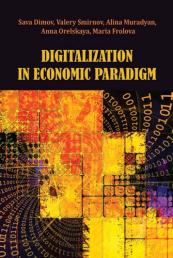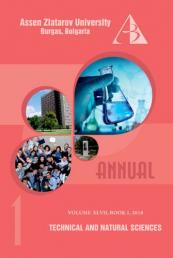Количка
Digitalization in economic paradigm
The monograph represents the results of the conducted research that reflects the key digital changes in the economy, including the digitalization of managerial accounting, business, e-commerce and industrial sectors, as well as the sphere of cryptocurrencies and the labor market. The driving force of these processes in the face of global COVID-19 pandemic is regarded.
The monograph also reflects the issues of the development of the digital economy and the introduction of the concept of Industry 4.0 in Russia and other countries. As part of the analysis of the digital transformation of the economy, different methods and modeling tools are used.
The monograph represents the results of the authors’ research.
The materials of this work will be useful to teachers, researchers, specialists of industrial, scientific enterprises, organizations and institutions, as well as graduate students and students.
-------------
In the XXI century the world moved into a new era of functioning. A digital revolution has come to the forefront. The beginning of the century we are living in is closely associated with an active introduction of digitalization processes into the modern economy. These processes are based on the rapid development of digital technologies and the use of the new digital tools of the fourth industrial revolution. These progressive patterns have influenced almost all spheres of life. Over the past half century, progress in the field of digitalization has been growing exponentially – almost no sphere of public life has remained untouched by digital transformation.
The embedding of globally competitive digital technologies into the economy continues. Such technologies as telecommunications, advanced manufacturing, artificial intelligence and VR systems, the Internet of Things are forming the world full of bright new ideas and opportunities. In addition, the modern digital processes are accompanied by the deglobalization and recession of the economy due to the COVID-19. The global pandemic has also been the pushing driver for digitalization as it has uncovered the relevance and practical significance of the issues of digital transformation.
The authors of the collective monograph “Digitalization” have carried out the analysis of the current state of the economy considering global challenges and new economic reality.
The monograph consists of seven chapters.
The first chapter is correlated with the principal definitions and main notions of the topic. The following aspects are examined: the essence of digitalization, its main factors, features and trends, as well as the industrial sector of the economy in the digital era.
The second chapter is linked with the analysis of digital business processes of enterprises in different countries. The examples of the Russian Federation and foreign countries are examined.
The third chapter is devoted to the analysis of the managerial accounting (MA) transformation under digitalization. Such domains as the peculiarities of MA digitalization and its possibility in the modern environment are considered. Moreover, the analysis of the main digital tendencies of this topic are reviewed. A lot of attention is paid to the Russian markets, e-commerce companies and marketplaces with regard to the digitalization of managerial accounting.
The fourth chapter concerns the tools of the processes of digitalization of economic systems.
The fifth chapter touches upon the subject of blockchain. The theoretical foundations and basic principles of this modern technology are considered. Examples of blockchain usage in Russia and in other countries are given. Furthermore, prospects of development and its main directions are also studied.
The sixth chapter deals with the digital aspect in training modern personnel. The following problems are regarded: insufficient financing of education in Russia, formation of a scientific and educational basis for the digital economy, e-commerce and distant work.
The seventh chapter is connected with the digital transformation of the economy within the pandemic frames. The basics of these processes are examined, the digital lag in different countries is reviewed, as well as such aspects as robotics, new technology startups, and threats to digital development under COVID-19 paradigm are considered.
The monograph reflects the views of authors of research on the listed range of issues.
-------------







